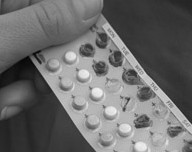|
|
 |
| Women's Health >>
Birth control pills (Oral
Contraceptives) |
 |
 |
 |
|
|
|
|
|
|
|
|
|
|
 |
|
|
|
What are birth control pills?
What are the types?
How are the pills used?
What if one forgets to take a pill?
When to start taking the pills after having a baby?
What are the benefits?
What are the disadvantages? |
|
|
| |
What are birth
control pills?
Birth control pills (oral contraceptives) are a
method of birth control that uses hormones to
prevent pregnancy. The man-made female hormones in
the pills change a woman's natural hormone levels
and prevent her ovaries from releasing an egg each
month. If a woman does not ovulate she cannot get
pregnant because there is no egg to be fertilized.
The cervix also produces less and thicker mucous so
that sperm cannot easily enter the uterus. In
addition, the lining of the uterus becomes thinner,
so it would be more difficult for a fertilized egg
to stay in the uterus. |
| |
What are the types?
The most commonly used pills are "combined" pills.
They contain man-made forms of 2 hormones: oestrogen
and progesterone. There is also a progesterone-only
pill (the mini-pill), but it is not as effective and
causes a lot of blood spotting between menstrual
periods. |
| |
How are the
pills used?
The combined pills usually come in a package of 28
pills. They are also available in 21-pill packs. The doctor
decides which type of package is best suited for a
person. She will probably advise one to start taking
the pills on the Sunday after the period has started
or on the first day of the next period, depending on
one’s preference.
are also available in 21-pill packs. The doctor
decides which type of package is best suited for a
person. She will probably advise one to start taking
the pills on the Sunday after the period has started
or on the first day of the next period, depending on
one’s preference.
If one is using the 21-pill pack, it is necessary to
take 1 pill every day for 3 weeks. One should stop
taking the pills for 7 days and then start a new
pack.
If one is using the 28-day package, it is necessary
to take 1 pill every day for 4 weeks and then start
a new package the next day. The last 7 pills contain
no medication for birth control; they just keep one
in the habit of taking a pill every day. It is
important to try to take the pills at approximately
the same time every day. The period will usually
occur soon after the last hormone-containing pill is
taken.
Some antibiotics can affect the way birth control
pills work in one’s body. If one is taking
antibiotics, it is necessary to tell the doctor. One
may need to use an additional form of birth control
while one is taking antibiotics. |
| |
What if one forgets to take a
pill?
If one forgets to take some of the pills, one will
have menstrual bleeding at unpredictable times and
one may get pregnant.
If one forgets to take a pill, it is necessary to
take it as soon as one remembers and take the next
pill at the usual time. If one misses 2 consecutive
pills, one should take 2 pills each day for 2 days
and then go back to the regular schedule.
If one misses 3 or more pills, stop taking the pills
and use a different birth control method until the
next menstrual cycle starts. If the menstrual cycle
does not start on schedule, it is necessary to get
in touch with a doctor.
If one has forgotten to take 2 or more pills and
have missed a period, one might be pregnant. One
should stop taking the pills and use other forms of
birth control until pregnancy is ruled out. One
should not stop taking the pills if one has taken
them correctly. |
| |
When to start taking the pills
after having a baby?
If one is breast feeding the baby, one should not
take oral contraceptives until one has a good milk supply.
This will take about 4 to 6 weeks after the birth.
Then, a low-dose pill or progesterone-only pill may
possibly be used. It is necessary to talk to the
doctor about when one can start the pills again.
Also, one should remember that breast feeding is not
a sure protection against pregnancy, so one should
use another form of birth control before one starts
taking birth control pills again.
contraceptives until one has a good milk supply.
This will take about 4 to 6 weeks after the birth.
Then, a low-dose pill or progesterone-only pill may
possibly be used. It is necessary to talk to the
doctor about when one can start the pills again.
Also, one should remember that breast feeding is not
a sure protection against pregnancy, so one should
use another form of birth control before one starts
taking birth control pills again.
If one is not breast feeding the baby, one may be
able to start taking birth control pills 1 to 2
weeks after the birth or when one begin menstruating
again. It is necessary to check with a doctor before
one starts taking birth control pills again. |
| |
What are the
benefits?
The main benefit of birth control pills is that they
are effective in preventing pregnancy but do not
interrupt sexual intercourse. The pills also may
decrease the risk of uterine and ovarian cancer,
ovarian cysts, rheumatoid arthritis, and ectopic (tubal)
pregnancy. Also, when one uses birth control pills,
the periods become regular, lighter, and less
painful. There is also a lower incidence of pelvic
inflammatory disease (PID), fibrocystic changes in
the breasts, and fibroadenoma (benign tumours) of
the breast.
Generally, women who have no gynaecologic problems
before they start taking oral contraceptives have no
trouble becoming pregnant after they stop taking
birth control pills, regardless of how long they
have been taking them. There is no advantage to
"taking a break" from birth control pills unless one
has problems specifically related to the pills. When
one wishes to get pregnant, it is recommended that
one waits until one has had at least 2 normal
menstrual periods after stopping the pills. |
| |
What are the disadvantages?
One disadvantage of birth control pills is that one
must remember to take a pill every day.
# Problems one may have while taking birth control
pills include: irregular bleeding for the first few
months
# nausea and vomiting
# weight gain
# breast swelling and tenderness
# increased appetite
# depression
# headaches
# scant or missed periods
# high blood pressure
# dizziness
Women who take birth control pills and smoke,
especially those over 35 years old, have an
increased risk of severe problems such as heart
disease and blood clots. The heart disease could
cause a heart attack. The blood clots may cause leg
pain or swelling, chest pain, stroke, or death.
It is necessary to monitor one’s blood pressure
after one has taken the pills for 3 months. Birth
control pills do not protect one from sexually
transmitted diseases such as AIDS. Latex condoms are
the only safe way to protect against AIDS.
It is necessary to consult a doctor if one
experiences:
* leg pain or swelling
* loss of vision or double vision
* bleeding irregularities
* more headaches than usual
* numbness of arms, legs, or any other part of your
body. |
| |
|
|
|
|
|
|
Disclaimer - The
contents of this site are for informational purposes
only. Always seek the advice of a qualified
physician for any doubts. |
|
| |


